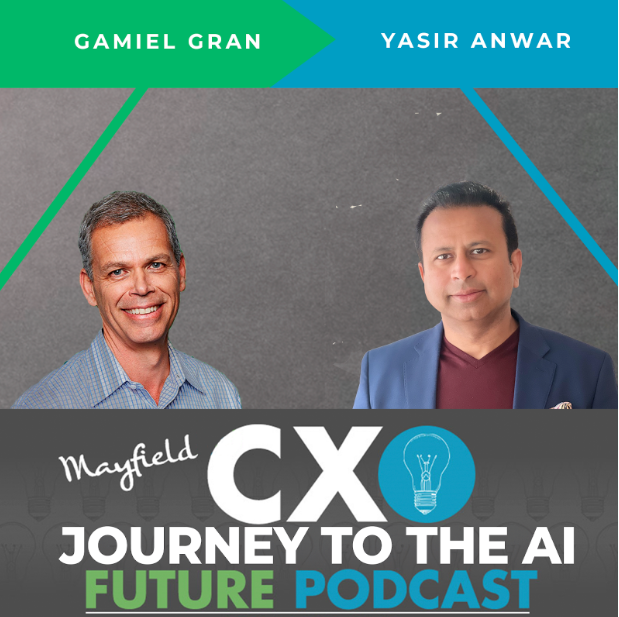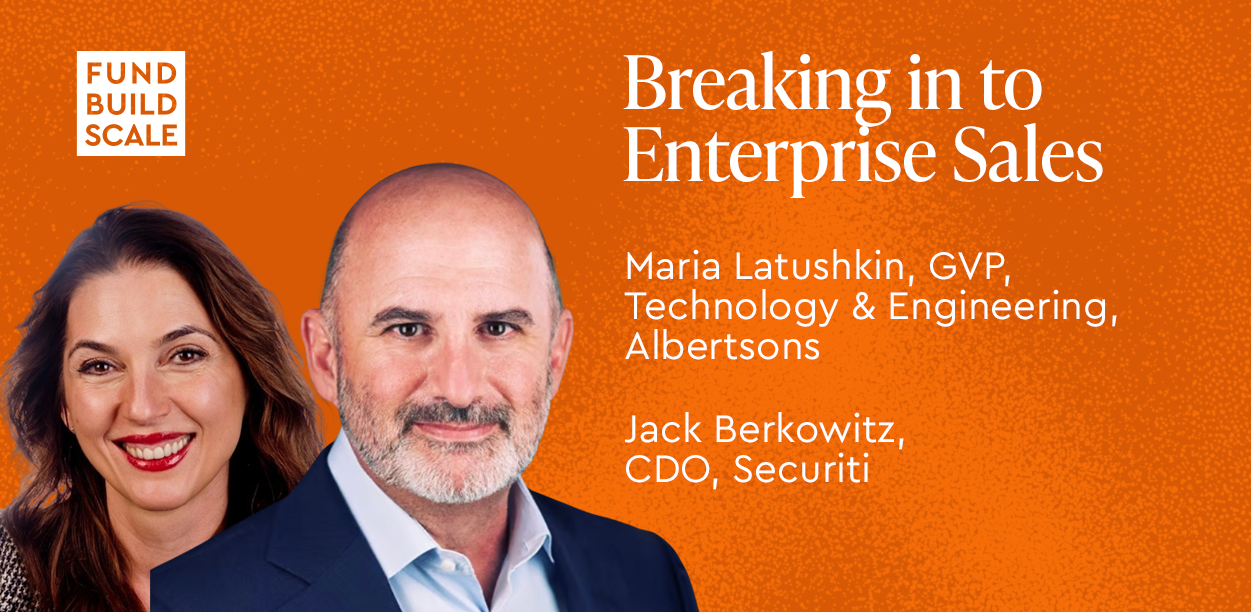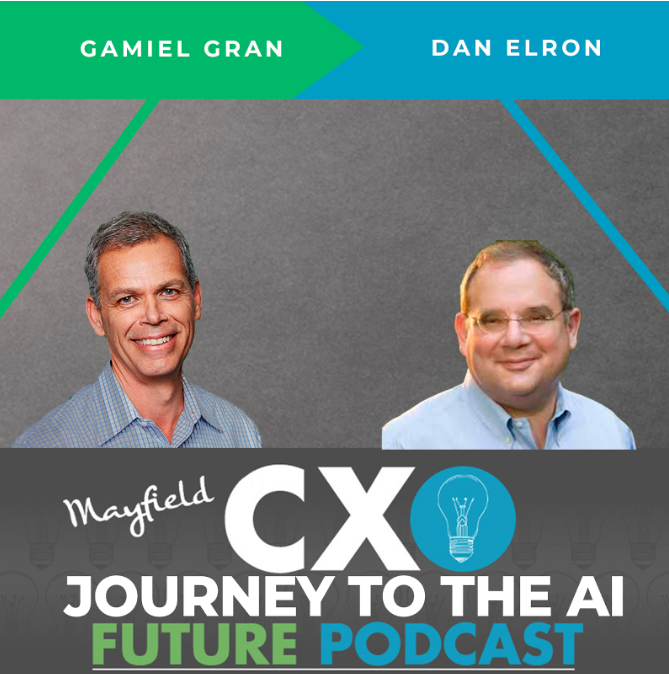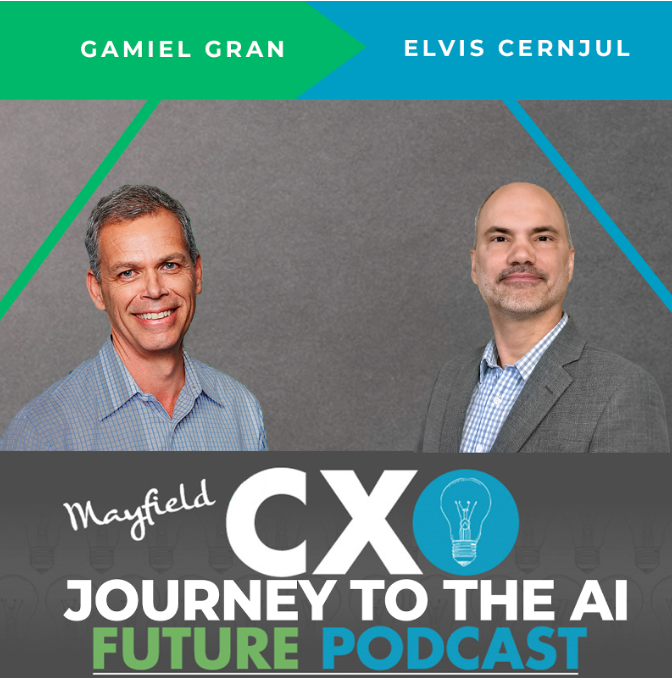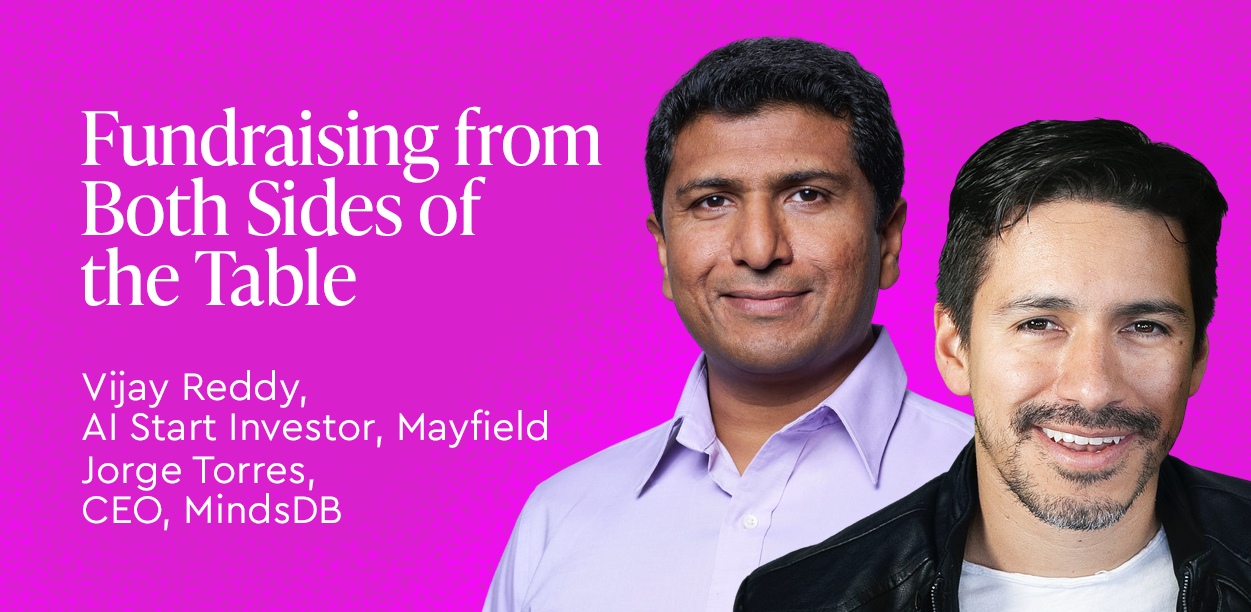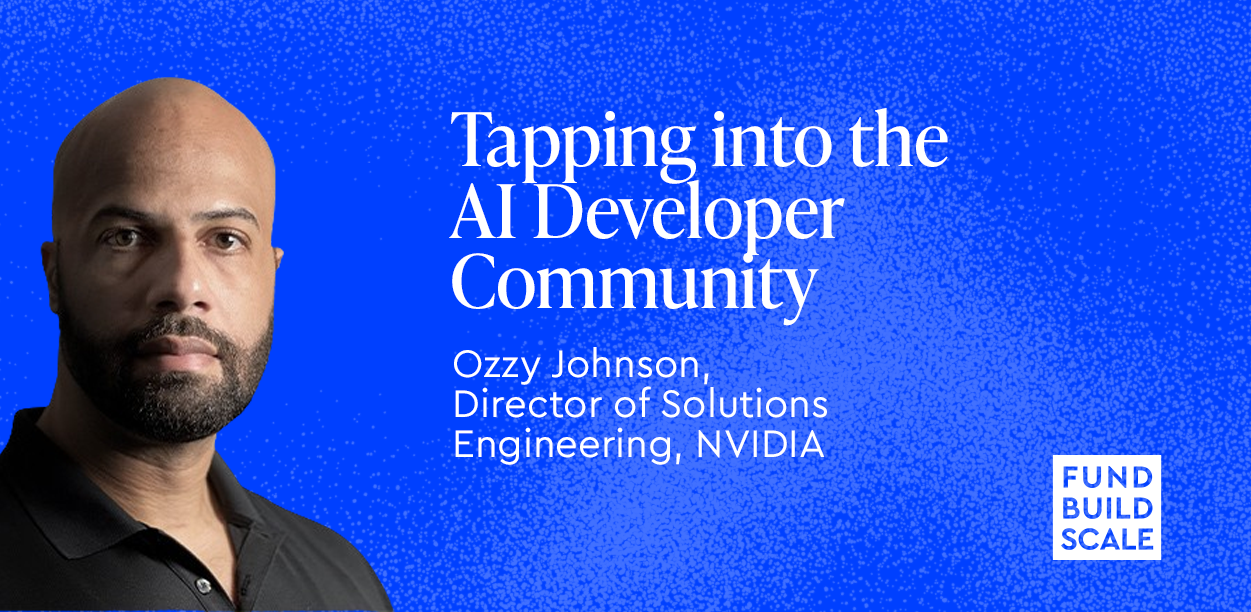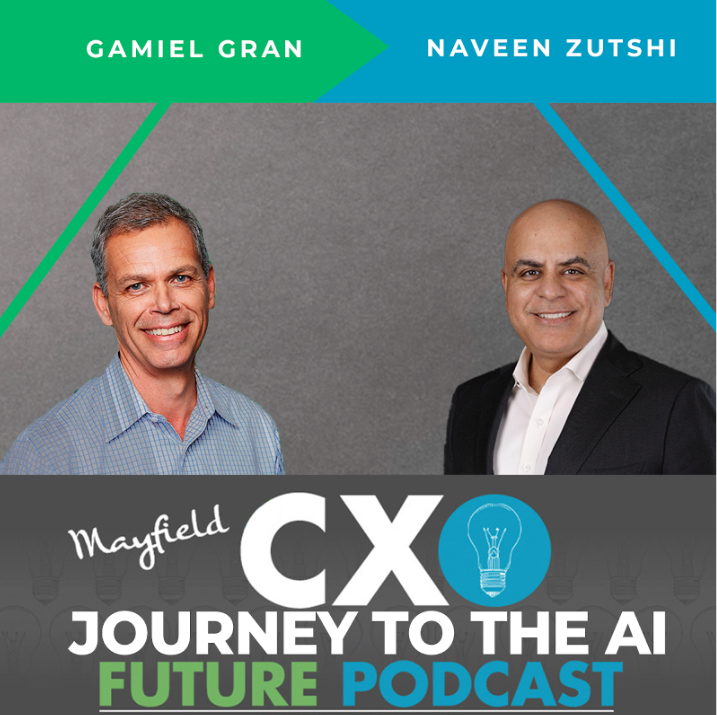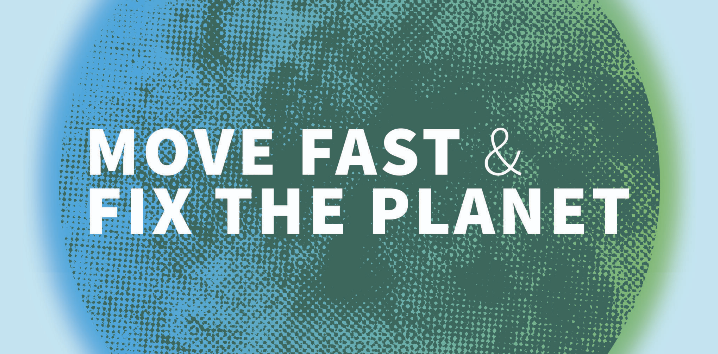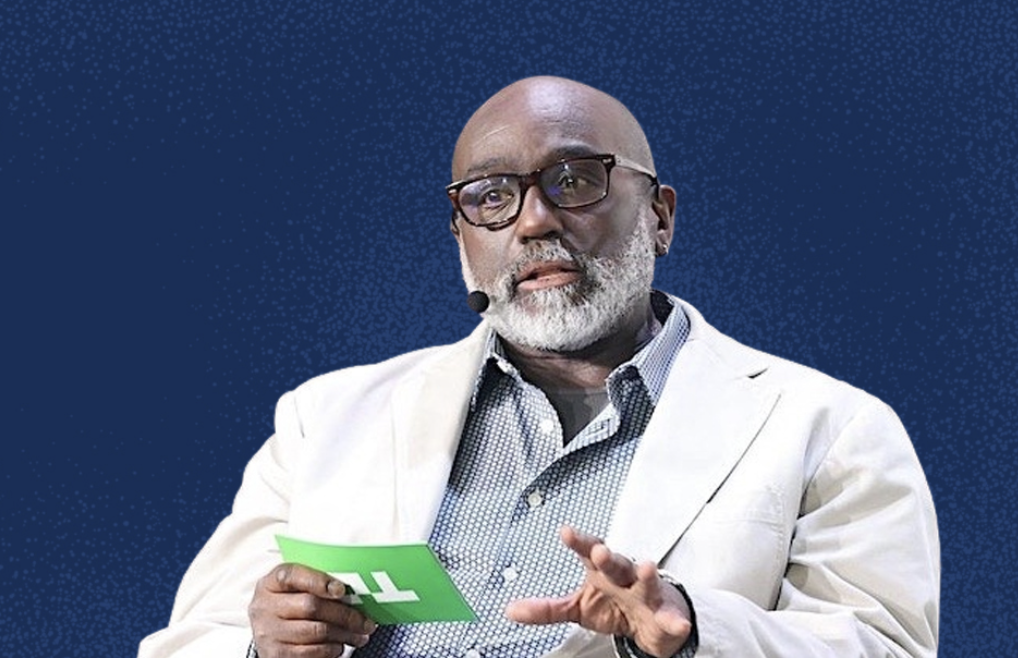Listen to the Podcast:
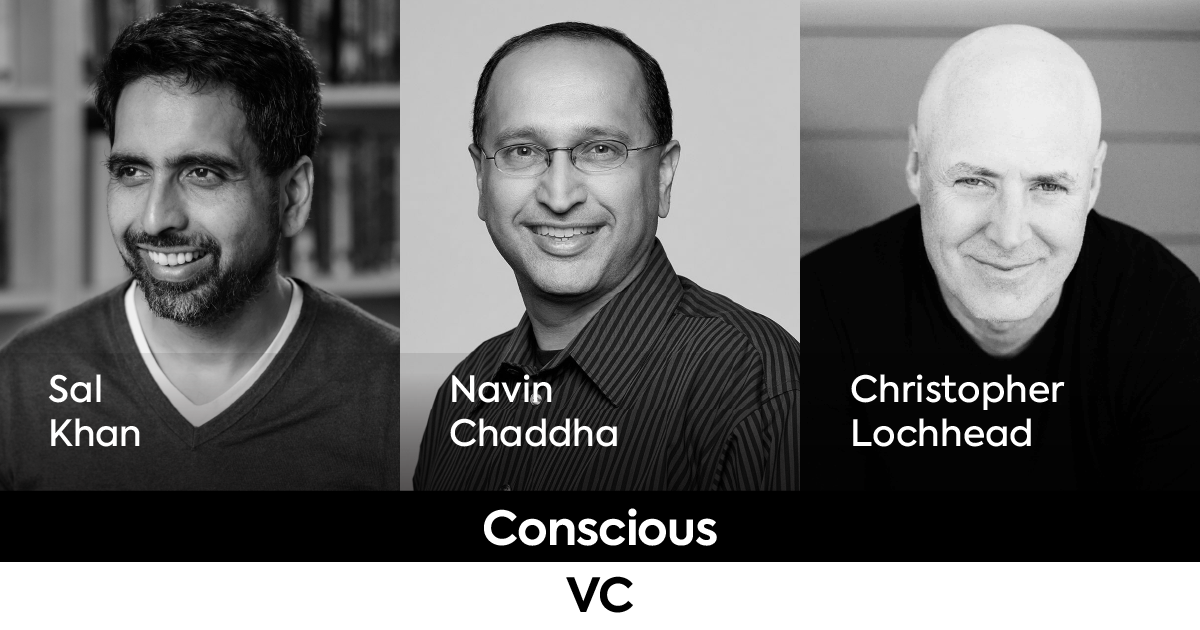
In this episode, Sal discusses what motivates him, his vision for creating Khan Academy, his hopes for its future and together with Navin, how our current times offer technology leaders, investors & entrepreneurs a unique opportunity to make a difference to the world.
The Role of Purpose & Vision in Building Movements with Sal Khan
Welcome to Conscious VC, where we have real conversations that explore how to build businesses that shape the future while making a giant difference at the same time. Hosted by Navin Chaddha, Managing Director of Mayfield, and me, podcaster and author, Christopher Lochhead. On this episode, Navin and I welcome the Founder and CEO of the legendary education non-profit, Khan Academy, Sal Khan. Sal left a very successful career on Wall Street to embark on a mission to provide free world class education for anyone, anywhere on the planet. Bill Gates famously said, “I think Sal Khan is one of the most exciting innovators in education.” Sal has been on 60 Minutes, the cover of Forbes and has been recognized as one of Time’s 100 Most Influential People in the World. Sal holds three degrees from MIT and an MBA from Harvard. And on this episode, we have a riveting conversation about the future of education, Sal’s key learnings as an entrepreneur, and so much more. Enjoy.
Navin and I were talking before we got started, about you, and one of the things we sort of were thinking about is, what motivates you?
Khan: Oh wow, your question ended faster than I expected. What motivates me, period? Not motivates me…
Yeah, what motivates a guy like you, or you specifically?
Khan: Well, I think that’s the ultimate question in life of like, what’s your purpose? Why do we exist on this planet? And I think it’s very seductive for us to kind of just fall into the patterns that we see everyone else do and just say, “Okay, what does everyone else my age doing? What do I need to do? Okay, it looks like success means getting a house, getting married, having kids and the kids have to be successful.” And I play some of those games too, but I have been someone who’s always been fascinated by, there’s got to be a bigger purpose, or maybe, or at least I got to make one up to feel good about myself. And so I think at the end of day, that’s what motivates me is that we find ourselves, we kind of awaken as sentient beings in this universe. We try to delude ourselves that we really understand what we’re doing and what’s going on.
But I think in that delusion, we might be giving up the more interesting, fun, mysterious aspect of it, which is it’s fun to kind of pierce the veil every now and then and say, “Well, why are we here?” And what can we do that could be more enriching for our lives for other people’s lives, that can make this limited time that we have on this planet at least this incarnation of ourselves that we have on this planet to be as rich and interesting and adventurous as possible.
That’s a great answer.
Chaddha: Pretty well said, all right. And having worked at Mayfield with over 500+ entrepreneurs and me personally, with 50 entrepreneurs on their board, I would resonate with more just Sal said. The great people are not just in for making a quick buck, they really want to make a difference to the people. They either want to change the way they work, live, or play, and they know whatever they’re working on, is like running a marathon, not a sprint. And they give it all, and it’s not easy to do that, but they always have a purpose which is bigger than them.
It is hard to think of starting up a startup without some kind of a purpose today, isn’t it?
Khan: Yeah, well, I’ve had multiple revs of trying to do startups. Khan Academy’s the first non-profit that I’ve ever not only started up, but ever worked for. Most of my career pre-Khan Academy was in a for-profit. Either working at a for-profit, I was famously a hedge fund analyst while I was helping cousins that evolved into Khan Academy. But yeah, I think that motivational question is important because I’m guilty myself, I don’t want to say that I have somehow transcended your traditional greed. I think some of the things that I tried doing in the late nineties, I think I was mostly motivated by wouldn’t it be cool if the world was different in that way? That was my primary motivation, but I’d be lying if I also didn’t say, but it would also be cool if I could buy a nice beach house. And actually, I haven’t fully given up that dream, but at some point you realize that it’s the, “Wouldn’t it be cool if we had a more equitable world? Wouldn’t it be cool if more people were empowered?” Who knows what happens after we die? But if you’re reincarnated wherever you happen to be, you have a shot at life, and you aren’t completely imprisoned in whatever context you are. I think that’s the ultimate, “Wouldn’t it be cool if.” And everything else, I think if the university is to conspire for it to happen, that’s great, but that’s not what you need to index on.
Chaddha: And I think what I would add to that is, with the whole Conscious VC program I’m spearheading for Mayfield, my belief is we need to stay a step back and see how can we help evangelize building business for better, rather than business for usual. And focus on a few things. One, how do we use technology to make humans superhumans. And really elevate them and empower them and give them voice. And this could be the 1099 workers, this could be business professionals in enterprises, whether a marketer, whether a salesperson, where not seen as a desk bound workers. They’re really seen as making a difference. The second thing is, we need to rehumanize social media and return to authenticity, return to purpose, return to humanity. And then, what can we do in our day job to invest in companies which are helping human and planetary health get better.
And the way to do that is, hey, you need to fund companies as a VC, which are looking at some of these things. Their leaders are acting as conscious leaders who combine empathy and candor. And at the same time, if you have the means, can you not only give back some of your profits back into the ecosystem, but also give your time to make a difference. I would say that realization of a conscious VC or a conscious capitalist, we are seeing more and more people step back. And Sal, you are a great example, who could have been raking a lot of money on Wall Street, and you said, “You know what? Let me empower masses, let me help people get over some of their small problems and use education as a way to get them there.” And I think it’s just the tip of the iceberg. I was like looking at some of the metrics on some of the stuff you’re doing, it’s mind boggling. Just mind boggling, what you have been able to pull together. Kudos to you and the moment you have created.
Khan: Appreciate that, and I have a deep insecurity that, Navin, hopefully we have a long way to go because the universe has not been dented sufficiently yet.
Chaddha: Yeah, I would joke, I always tell my team, “Hey, what got you here is not going to get you there.” And maybe Sal, even though you have done extremely well, maybe you have just gotten to base camp. Still there’s a lot of way for you to conquer your dreams and get to the summit of Mount Everest. And that’s what I believe with the platform you have created. It just has endless possibilities on where this is going to go.
Can you give us a snapshot of the Khan Academy today?
Khan: Yeah, our mission as a not-for-profit, is a free world class education for anyone, anywhere, which is a big statement. Some would argue, especially when I started all this in a walk in closet. I’m actually in the same walk in closet where this all started so the world goes through cycles.
It would have seemed delusional back then, but it seems a lot less delusional now, but we still have a long way to go, as Navin just hinted at. But there’s three pillars to that mission, three parts of our vision, I guess you could say. One is, to create a world where anyone on the planet can access their potential by getting world-class rigorous, core academic learning, from pre-K through elementary, middle, high school, and then even college. That if they have access, that it’s done in a way that meets their individual needs, technology gives us this potential to really personalize, and also not move lockstep, allow them to fill in any gaps that they have and then work on their learning edge.
And then the last piece, the last pillar is, can we create ways that that learning can lead to opportunity? And you could view this as credentialing or some type of certification, that can lead college admissions, or get an apprenticeship, or a job of some kind. In terms of where we are right now, I think we’re at 110 or 115 million registered users. Pre-COVID, we were at about 20 million learners a month, now we’re about 30 million learners a month. Pre-COVID, we had about 30 million learning minutes per day. Now we’re seeing, at least we saw in the spring and it’s ramping back up to that now, back to school about 80, 85 million learning minutes per day. In math is where we are most comprehensive.
We have Khan Academy Kids, which is an early learning app. Everything I’m talking about is free, non-commercial, it’s funded primarily through philanthropy. Khan Academy Kids is math, reading, writing, social/emotional learning, and includes hundreds of books in it, et cetera. And there’s a lot of efficacy studies on how that’s been able to help a lot of kids, including my own kids. But then when you get into elementary school, we for sure have math, we’ve started with some English and language arts, but primarily math. Allowing you to learn at your own time and pace, get practice. Middle school and high school is where we not only have a lot of depth in math, but also start increasingly the sciences. And then an early college, those general ed. We have a lot in math and science, and even things like economics.
But the goal is to fill that all out over time if we can find the capacity, and the focus, and the resources to do it, and then connect it to the broader world on giving people opportunity.
And how outrageous of you to say that education for everybody on the planet, a world class education, could and should be free?
Khan: Yeah, it’s outrageous on one level, but I think it’s at the end of the day, I haven’t had anyone like really disagree with that. If you think about the bet of the public education system, arguably our mission statement’s the exact same thing as the global public education system of free world-class education for anyone anywhere, it’s an aspiration. I think these days it’s very easy to beat up on public education, and there’s a lot of things that are imperfect, a lot of things that need a fix. And we’re trying to work in partnership with school districts and teachers to help address some of that. But I think it is worth giving credit for how much the world has transformed because of this very aspirational public education.
I would say 500 years ago, well, actually most of the world, 500 years ago, you had about a 15 or 20% literacy rate. And I suspect if you asked someone who knew how to read, what percentage of the population is even capable of reading. They might’ve said about maybe 30%, 40%, but this utopian idea of mass public education that came around in the 18th and 19th centuries, it got us, especially in the first countries that developed a middle-class because of it, pretty close to 99 to almost 100% literacy rates.
And so I think we’re just in the next leg of that. Khan Academy’s almost doubling down on that mission statement. It’s not somehow a replacement for what’s already going on, but what can we supercharge the existing system with so that we can get to, not only 99% of the population knows how to read, but 99% of the population can do calculus. 99% of the population can be one of Navin’s entrepreneurs, 99% of the population can write the next great novel, or support their family, or just feel that they’ve reached their potential.
It’s an incredible aspiration. And what I’m also very curious to ask you is, what have you learned along this path that you think is germane for other entrepreneurs? Be they creating non-profits or for-profits, what are the key learnings that you’ve had so far on this journey?
Khan: Oh, so many. I would say for me, it was being very focused on the problem, and learning about the problem on a very focused level. I didn’t start this saying I’m going to start some type of global non-profit, I started saying my cousins needed help. But I did in the back of my mind, I have this background in software and it’s human nature to say, “Okay, maybe I can understand their problem, and maybe I can figure out some scalable solutions for their problem.” But step one was really digging into the problem. I didn’t have some fancy AI neural network and then say, “Okay, where can I apply this?” And maybe some people succeed that way, but I definitely started with the problem. And I said, “Okay, what tools are at our, at my disposal or collectively at society’s disposal that can solve this and then can help scale.”
I never got enamored with the technology. I always got enamored with, what’s the problem we can solve, and then what technologies are there? And it could be a talk, it doesn’t have to be a computer even, or fancy AI. I think that’s one. I think the other one that I’ve seen over many cycles of entrepreneurship, and then just observing a lot of my friends who are entrepreneurs is, timing can make a big difference. Sometimes the market or the technology is mature enough that it’s ready, and sometimes it’s not, I mean, there’s many failures that I’m sure Navin and everyone can point to from the nineties that, that failed in the nineties, but then became billion dollar companies in the last 10 years. And from a personal entrepreneur point of view, a personal entrepreneur does not have the luxury of maybe taking 50 shots at goal and hoping that one of them eventually makes it.
And so what I say is, try to make your organization, if you truly have conviction that eventually the world will have resonance with what you’re doing, try to make it as un-killable as possible. And the Khan Academy narrative often feels like a lot of startup narratives. Someone had an idea and they did it in this kind of homebrew way, and then they got funding and then it scaled big. But I was working with my cousins for three, four or five years before I even contemplated quitting my day job. I know that’s not typical. I mean, it shows, I mean, I’m an entrepreneur, but on some level I was very risk averse. I was really letting this thing marinate and get some real traction, and get some real validation. And that even as Khan Academy is starting, I mean, this is the thing that keeps me up the most.
We now have a pretty substantive budget, that I have to spend a lot of time trying to raise for. But how do you make sure that it can sustain? If for whatever reason, what you’re working on becomes a little less popular, or capital dries up, or whatever, is there a way that it’s going to sustain? Because if it’s a good idea that can impact a lot of people, for-profit or non-profit, as long as you can exist and sustain, at some point, you’re going to hit those inflection points. And you’ll never predict what they are. I mean, I could have never planned for in 2010, all of a sudden Bill Gates starts talking about Khan Academy. You can’t put that in a business plan, but I existed, Khan Academy existed at that point so it created that possibility.
I could not have predicted, there’s a bunch of events I can point to in Khan Academy’s history that I couldn’t have put into a business plan, but had we not been sustainable and existed for those, then they would have never happened. The last thing I would say is just, it’s important to have a big vision, but have some credibility towards it. A big vision, but then really be very hard nosed and pragmatic about what are the next steps to that. I’ve seen people over index on one side of that big vision, but it’s just, they want to jump all of it at on versus the other way. They just want to make these baby steps, but they can’t articulate how the world’s going to be different because of it.
Chaddha: Having been involved with so many companies and hundreds of these entrepreneurs have an IPO, and over 200 have been acquired. I would echo what was just said. It all starts with a vision, and the mission, and the key inside. How are you going to make the world a better place? But then the next thing you need to go check is, is your product or service having a painkiller value proposition, and it’s not a [inaudible] because there’s so many solutions out there. With what Sally has done, that just really resonates. Not only does it have the vision, but it’s a painkiller value proposition. I’m going to provide you free education, which is better than many, many, many, many schools can provide. The third area I would say is, focus is extremely critical because startups and businesses die of indigestion. They don’t die of starvation, but at the same time, dinosaurs never survive so you need a culture of nimbleness.
You need to continuously keep iterating to get better, and better, and better. And then when you’re running a business or starting on a novel journey like what Sal has done, it’s a marathon. It’s not a sprint, it’s not going to happen overnight. It’s not like the Coronavirus, which will spread in three to six months and bring the world halt. You need patience and perseverance. And then finally, what I have learned is, it all comes down to the people. The people you recruit in your team, the people who are your partners, the people who are your evangelists, the people who give you money. As a venture capital firm, we have to get likeminded investors who are okay with liquidity coming over 10, 12, 14 years. They’re not trying to make a quick buck.
It’s a combination of things that have to get right. And along the way, luck is really, really important because whatever product you’re building, if you can find product market fit, which is just timing, I believe companies better be lucky and smart because if you can do that, you have endless possibilities. I think those abstracting back from the for-profit world, a lot of those resonate with Sal’s experience at the Khan Academy. From the for-profit world, it’s not dissimilar. It’s very, very similar.
One of the other similarities I’m curious to tease out with you is, Sal, I’ve watched you from afar and admired you for a very long time. You seem to be a natural evangelist to me, but I’m curious how you think about yourself in terms of bringing this mission and vision of yours to the world?
Khan: I do tell our team, don’t try to communicate something unless you’re excited about it. I’m usually saying it in an education context. I’ve obviously made a lot of the content on Khan Academy, but we have folks who create content, or even write a question, or write code. And I was like, “If you’re not excited about what you’re doing, if you don’t truly believe in it, it’s somehow going to show up in your work.” And so you’ve got to really believe it. And at the end of the day, if you truly believe it, and if you’re authentic, it will show. And so I thank you for your praise, maybe, but it’s really just me. I have a model in my head of what I truly believe, and I try to be as authentic and honest as possible about what I think can happen.
And also what are the positives and negatives that might be part of the journey to get there. I mean, one of my roles is to keep making content. I think it’s important as a leader to actually stay close to the problem. Otherwise, it’s very easy to get abstracted from it. And it’s always well intentioned people, but once you start having some layers of management, it’s well intentioned people, but by the time it gets to you, the information is sometimes not as authentic as it can be. And so if you stay close to the problem, I think there’s a certain beauty to that. Frankly, I derive a lot of my energy from the direct work of the education so it’s even a bit of a selfish motivation that I still make videos.
It’s a creative outlet for me personally, it’s a way for me to get connected with, with students. I’m always working on my own skunkwork startup projects. It gets kind of gets that piece out. And my role is to make sure that Khan Academy can really stay true to the vision now, while hopefully I’m alive for many decades. But I’m starting to think about, well, how will it happen once, at some point I’m going to get hit by a truck. Hopefully not hit by a truck, I’m going to die. Something’s going to happen. How do we retain that focus on a mission, which historically non-profits can be reasonably good at. But at the same time, what Navin mentioned, staying nimble.
There’s one fear that Khan Academy disappears and it’s not able to fulfill its potential. There’s another fear that it fulfills its potential, but then it becomes the legacy. It becomes the entrenched interest. And then there’s some Sal Khan in 30 years who’s like, “I got to take down Khan Academy because they’re all bloated and they’re just protecting themselves and their own interests. And the education system is not changing because of Khan Academy.” That’s a bigger nightmare. And so how do I put the seeds in the culture, so that over time we don’t turn into that?
Chaddha: And I think in my experience, I would echo with what I’ve seen at Mayfield, as a leader, as I run Mayfield, but also having been on 50+ boards, I think something that just got touched. I think it starts with the leader and ends with the leader. Leaders who have radical candor and empathy, and create a safe environment, and end up creating a cult and a culture. Where it’s about people first, mission first, values first, end up promoting a culture of authenticity. And they’re able to give voice to others and they’re loyal to a fault. They care personally, at the same time they demand straight, radical candor, but they don’t beat around the bush and are able to challenge directly. There is this healthy balance and we have Kim on one of our podcasts, Kim Scott, before, the author of Radical Candor.
And then finally, what I have learned is the respect you can give to each other. Whether it’s a team, whether it’s your customer, whether it’s a student, whether it’s a teacher, and give people a chance because everybody in this country, many of us are immigrants on this call, need a chance. All of us.
All of us need a chance. And if you can embrace the unconventional, the different, and the unusual, those are the people. If they’re given a chance, they work at 10X and it’s our job to essentially as leaders, how do we promote diversity, equity, and inclusion, and bring some of these ideas to the table. And if we can do that, the world is going to be a wonderful place. And I think it’s going to take effort, what Sal has done in education, in the not-for-profit world. If in the for-profit world, people can even start spending 1% of their time, 1% of their profits, or even start a bit lower. It’s going to make a huge difference. Think about the amount of cash are top IT companies are sitting, it’s a bigger than most economies in the world.
So if you put that to work, how would make this world a better place? And education is one part of it, hunger, health, and inclusion are some of the other things where everybody needs a chance.
Khan: And Navin my shameless plug there is, if we’re creating a physical society, a village or a town, you have your corporations and then, they’re kind of contributing to things that are part of the public good. Your police station, your fire station, the museums, the parks, the libraries, the schools. Can we think of the analogs in this virtual realm? Because to your point, Navin, this incredible productivity and wealth that’s happening through essentially, things like the internet and artificial intelligence, other things, what are the analogs that we can create in this public sphere? And I actually think, I try to appeal not just to what you’re appealing to, which is people’s desire to create a better society, but also just their own self interest, which is, if we don’t create these places for civil society and empowerment on the internet, then trust of these things are going to be undermined.
As we see it’s happening and people are mistrusting. A lot of the big tech companies used to be the things that people used to say, “Oh, those are the most aspirational, trusted companies.” Now politicians and others are trying to start to beat up on them because they look like they’re getting disproportionate benefit from the direction that the world is going into. I think there’s room to exactly, as you mentioned Navin, if 1% can go to creating the education systems, the libraries, the public services on the internet that are truly altruistic, and I believe Khan Academy, Wikipedia, we could probably think of a handful of others then, the sky’s the limit on what we could do.
Chaddha: Yeah, and I would say with so many people, not having jobs, not only in the United States but also globally, a lot of this workforce can be retooled and a world can be reimagined where you have boundaryless enterprises and you can bring them jobs. I know you have started an effort on live tutoring, and you will do it in a not-for-profit world, but I see hundreds of ideas of people trying to do this on a for-profit basis. But if I look at it, yes, they’ll try to make money. But think about how many people have been furloughed with this online experience, how many people can be teachers? If you can benefit the student and bring some of these people together, do live tutoring, but also think about interactivity.
Think about human connection, because two of my students one is a middle schooler, the other is an elementary school. I actually told them, I’m going on a podcast with Sal. They said, hey, make sure tell him that how much they love what they learn, and mom pressurizes them outside of Harker to all this stuff. But I asked them, what are you missing the most? They said, “The social and the emotional experience. Our best friends, we can’t see them in person.” Sitting in the room and getting motivated by teachers, and the collaboration we were doing by being in smaller groups and then coming together, it all just boils to human connection. Even in a peer to peer setting. What do you just added, it’s just mind boggling. Now, we are going to have two parallel universes. How do we bring together? Commerce has become hybrid but the rest of the world isn’t. I think I just see this as endless possibilities. And at the end, I think the sky’s the limit.
We need just both leaders, whether it’s in not-for-profit or for-profit, to be thinking about these and saying, how do I help people? I think people aren’t happy right now. It’s not just about their livelihood, but it’s also sitting at home, staring on Zoom, not able to socially interact, always being worried, “I’m essentially going to fall sick.” People are not comfortable.
Khan: Yeah, couldn’t agree more. And this effort that you’re talking about, the schoolhouse.world, this is something I’ve always dreamt of doing because obviously Khan Academy people can get practice and instruction at their own time and pace. But what about that live interaction? And then with COVID, we saw Khan Academy’s traffic goes through the roof, but we saw also the inconsistency in live interaction. Some teachers were able to do it well, a lot weren’t. And so this was an effort and I just started talking to volunteers, can we find folks who are willing to one, help build the platform so we can match students who need help with topics, academic topics? Eventually, it could be all topics, and vetted tutors who are willing to provide that. And completely agree with you Navin, I think not only is it a way to provide that extra layer of education. I’m hoping to come up with mechanisms that promote both volunteerism for those who can volunteer.
I think any of us on our lunch break, and I did it the other day where I tutored some kids from Ghana, Pakistan, and Connecticut all at once. And it was a fun use of my lunchtime, but also provide potential work for people who could do it, but have a peer to peer mechanism. We’re also looking in certification right now. Expect an announcement in a few weeks around a series of major universities that are going to look at actually how good you are as a tutor on a platform like this, as an indicator of whether they want admit you. Because if you think about it, that’s a bigger signal than an AP score or an SAT score is that, you’re teaching math, you’re teaching calculus, you’re teaching statistics, and you’re highly rated. And so I think this could get to this whole new world of where technology is facilitating. It’s not what we’re leading with. It’s really a way to connect human beings to unleash just a lot more potential.
Chaddha: And one of the things I would love to hear your views, because on a bottoms up basis, let me give an example of what Mayfield had been doing for over 25 years. We have this Mayfield Fellows Program at Stanford for the last 25 years, where we pick 12 students every year and take them through a rigorous nine month entrepreneurship program. These are undergrads or coterms. And they’re coming out as winners, they’re becoming execs, they’re going into companies, starting startups. And we realized, you know what? This is the best place to give them training, not at the MBA level. But it’s six months of classwork, case studies where they collaborate, make presentations, but three months of real internships at startups. And then I realized, wow, Stanford has all the resources and we are doing it here, why don’t we take it to the URM universities and colleges?
We are teaming up and launching the Mayfield Summer 2021 Fellows Program. Two institutions we have partnered with Code 2040 and College Track, where we are starting fellowships for two diverse environments. One is the Code2040, which is more focused around how do you get computer science students from the black and the LatinX community into the tech world, and get rid of all this diversity and bias people have, unconscious bias. And at the same time, we’re doing the same with College Track, in creating a fellowship program where we can get five students from each of these every year, take a 20 year outlook. This can become a virus. We are trying to do what you just said, a hybrid thing. Learn online, come together online, go work in a physical place. Okay, next year it may not be physical, but then share the learnings with each other.
What I call the peer learning aspect. And then we have done initiatives, which I think you’re familiar with like Akshaya Patra, they’re in India. In order to bridge the gap between hunger and education, we have partnered with them, they provide hot meals to millions of students as a motivation for them, in kindergarten, K to five, and middle school to come to school. I’m just seeing these innovative models, which are happening on this physical hybrid, online hybrid world. Would love to just share your views on how with what you have seen, how do we get these two worlds together?
Khan: Yeah, well I think your point is exactly right. And I would love to your point, I completely agree that these opportunities, these fellowships, these apprenticeships, these are the real fast tracks to opportunity. And I think there’s a world where, in partnership with folks like yourself, imagine if we could show you a hundred kids that are excellent tutors at calculus, or even excellent tutors at finance, or whatever. Not then you know that they have strong technical skills, but then you know that they’re great communicators, they have empathy, they just know how to deal with other people, they’re collaborative.
If you knew someone had those skills, I mean, I know you hire a lot, your portfolio companies hire a lot, we hire a reasonable bit. Those are the people we want because if they have those raw ingredients, then the sky’s the limit with them. And so I think there’s some really powerful ways that we would love to partner with industry as a whole, so that we can create pathways from learning on, whether it’s Khan Academy or schoolhouse.world, to evidence of mastery. And it could be, hey, I know my calculus or I’m also a good tutor at calculus, or biology, or chemistry, to getting apprenticeships and jobs because then actually, you can even take out the whole gating influence of, where did you happen to go to college or not go to college, et cetera.
Chaddha: There you go. One plus one can be 11 here, from what I just learned.
Khan: There you go, that’s my kind of math.
All right, gentlemen, is there anything else you want to touch on before we wrap?
Chaddha: I think from my perspective, we need more people like Sal has done with his life, who are helping building businesses for better, and are making a positive impact in the world. And I hope many people and entrepreneurs who don’t need to do this, including VC’s like me, 100% of the time. But with our time, money, ideas and access, can we even start with 1%? And that’s what Mayfield has started with the Pledge 1%. And my belief is, each small drop in a bucket fills it, many buckets fills in a pond, and then sky’s the limit. We have to just get started and have role models like Sal and others, who are showing us the way. And I think we have endless possibilities. And yes, if we do all this stuff and invest in relationships and not transactions, there will be business benefit. There will be business benefits, for everybody. It will be, you’ll get great employees, you’ll get great 1099 workers. They will do the stuff and it spreads like a network and a virus, and you just get better.
Khan: Yeah, and what I would just add to that, 100% agree with everything you just mentioned Navin, is anyone listening, there’s a lot going on in society that a lot of folks are feeling anxious about. Obviously COVID is just making everything that much worse, but we are in the most exciting time in history where the tools, the way to disseminate it, the plate tectonics of society, when these start shifting and the tools start shifting, it can be painful. There’s some growing pains, but it’s also the time of biggest opportunity. And I remember when I was a kid and I used to read about people like Henry Ford and say, “Oh, well, they showed up right at the beginning or the early phases, really the mid phases of the industrial revolution.”
But that’s right as the car industry was picking up, or you think of Edison, right as electronics and radio was picking up. I think what we’re going through right now is 10X, actually, any of those transitions. And we’re just starting to realize it, because not only is it getting at these traditional notions of technology around automation and productivity, it’s touching on fundamentals of what does it mean to be human, human potential? How does humans interact with each other? How do you unlock potential? And it’s going to have many, many multiplier effects. I think all I do is encourage folks, including myself, to think as much first principles as possible. I know that no one can see it, but behind me I have a bunch of science fiction books. And I read a lot of science fiction one, because I find it entertaining but two, because science fiction authors are really good at questioning assumptions about society and then extrapolating forward. And I think entrepreneurs who do that type of thing are going to be in a position to really change society, hopefully for the better.
Gentlemen, thank you for a legendary conversation. I really appreciate it. Sal, it’s great to meet you. Thanks Navin.
—
Thanks for joining us on Conscious VC with Navin Chaddha, Managing Director of Mayfield, and me, podcaster and author, Christopher Lochhead. You can find me on the internet at Lochhead.com. Conscious VC is presented by Mayfield. Visit Mayfield.com, where you can learn more about the five pillars of conscious capital and much more. Thanks again for pressing play.


